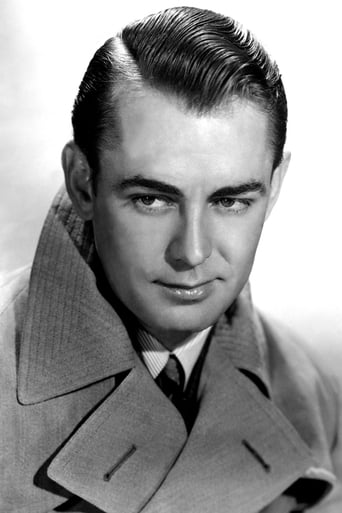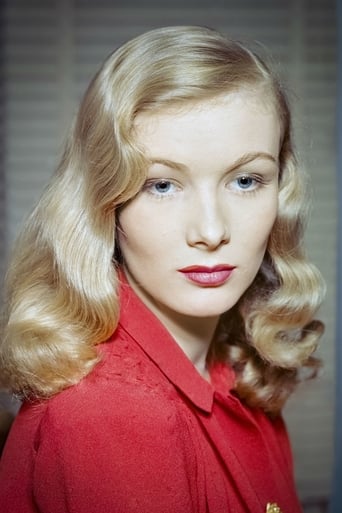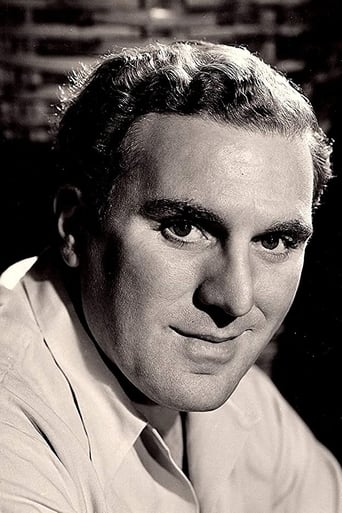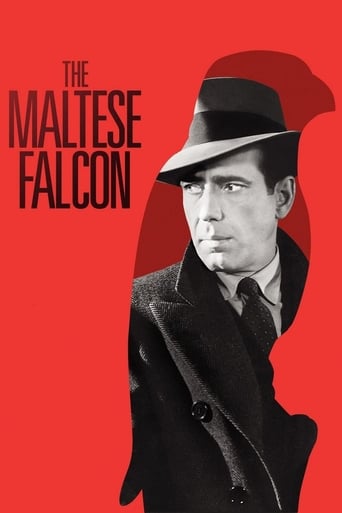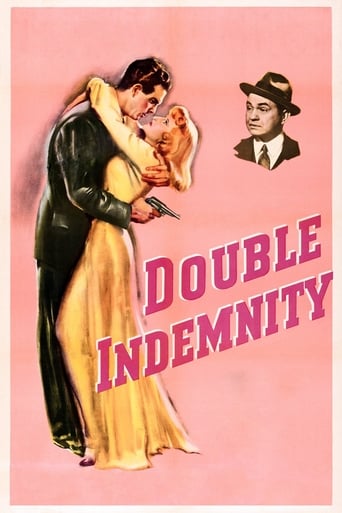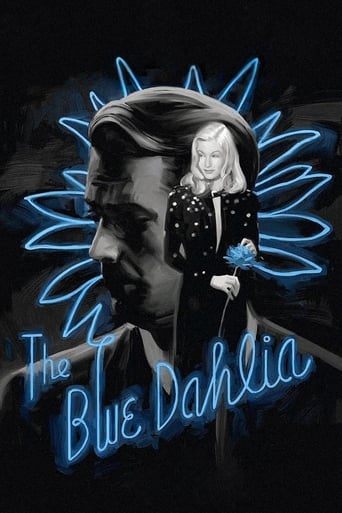
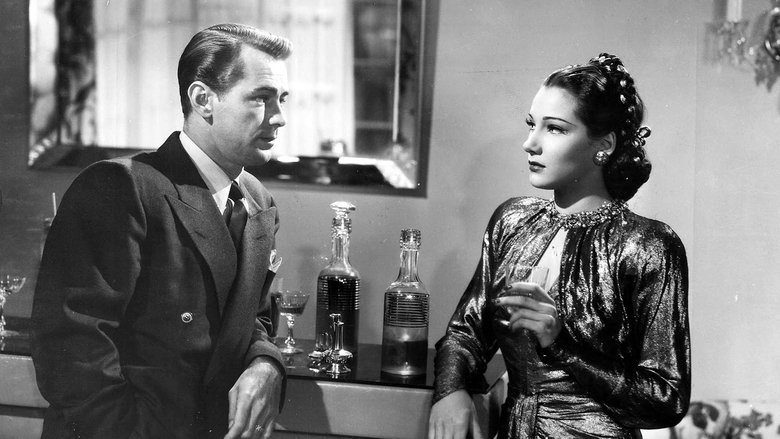
The Blue Dahlia (1946)
Soon after a veteran's return from war his cheating wife is found dead. He evades police in an attempt to find the real murderer.
Watch Trailer
Cast
Similar titles
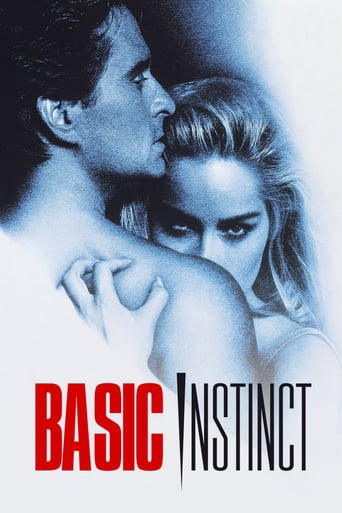
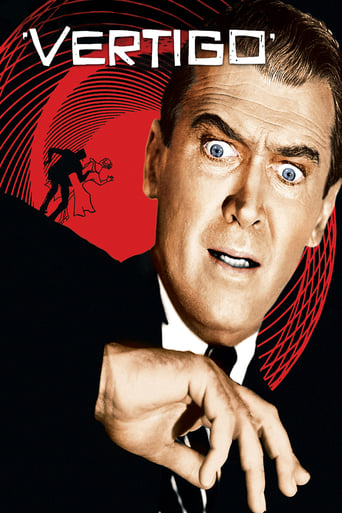
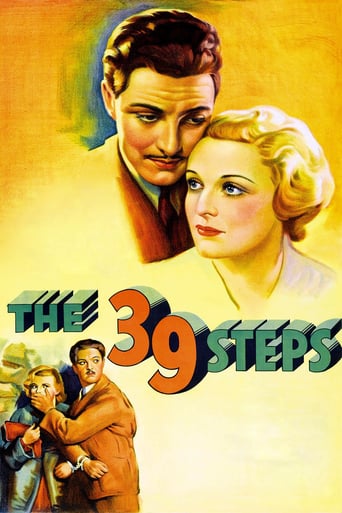
Reviews
hyped garbage
Good movie, but best of all time? Hardly . . .
I wanted to like it more than I actually did... But much of the humor totally escaped me and I walked out only mildly impressed.
The acting in this movie is really good.
It is inevitable that films date, especially those of the film noir/femme fatale type which were so specific to the 1945-1955 period, possibly in response to the end of World War II. Suffice it to look at the cars on show to know that the film is dated, so to me, dated or otherwise matters not one iota. What matters is the actual story and relations among the characters.In this case, the main character, Navy skipper Morrison (played by Alan Ladd) returns home from the war to find his wife throwing a party, and bestowing her attentions on the rather smug top villain Harwood (Howard da Silva), whose real name is Bauer (a German name, to boot).Ladd's character is Hamlet-like, seemingly moving between Malibu and other places to stay away from his wife, but never staying, and in the process he meets Lake, who -- small world -- is married to Harwood. But the two are such decent and good people that, though obviously in love with each other, never take it further. Despite being the leads, they do not even appear for that long on the screen, their acting ability is not particularly evident, and Lake's character, in particular, is so bland that anyone could have played it. Of course, they were the hot duo of the day after the success of THIS GUN FOR HIRE, and the studio capitalized on that popularity, but their relationship does not have much of an impact on proceedings.Fellow soldier William Bendix, with a metal plate in his head, and constantly forgetting things, steals the show, as does the blackmailing motel caretaker played by Will Wright.What seems to begin as an action film noir, eventually turns into a whodunnit, which does not make it exactly credible. The supposed femme fatale, Morrison's deceitful wife, dies early on, so she is fatal to herself. Lake's character is slightly duplicitous - married to Bauer but in love with Morrison - but she is otherwise a kind soul, certainly no femme fatale.Those are some of the holes in Raymond Chandler's screenplay. George Marshall's direction is assured but average, and photography is possibly the film's strongest aspect. 7/10.
All right, so this is not a perfect film by any means but it does make for a pretty good film noir. In parts, the film does seem a bit rushed and chaotic. However, that all makes when you read the trivia section of the film on IMDb- the production of the film itself was rushed due to several factors, including Alan Ladd's expected induction back into the military service.After seeing several of her films, including this one, I can honestly say Veronica Lake is a fascinating screen presence in all of her scenes. She and Ladd,whatever their differences may have been in real life, did have real chemistry on-screen.Lake may not be the best actress there ever was, but she had a certain charisma about her in all of her roles, and although this role doesn't demand very much, she makes the most of her time in the role. She was also very beautiful, and my eyes always go right towards her whenever she is on-screen (no offense to Ladd.) Hers is a very sad story of how quickly a film career can go south, and I find it kind of sad that she was branded so difficult to work with by many of her co-stars.Fortunately, a lot more is understood about mental illness these days, and some actors (Catherine Zeta Jones is one example) who suffer from it can still enjoy a successful career. Lake had a truly outstanding role in "So Proudly We Hail!" and you can really see how talented she actually was in that film. It's hard to believe she was so young both when when her career started and ended.The supporting cast of this film is also great. It's nice to see Hugh Beaumont play a role other than Ward Cleaver, and Doris Dowling is a stunning woman, even as Alan Ladd's nasty wife. All in all, it's a fun movie and I'm glad I discovered it.
I've watched this movie over a few times recently, not because it's a flawless noir masterpiece—it isn't—but to enjoy the characterization, the period feel and that unique Chandler dialogue. The parts add up to much more than the whole, I'd say. In discussing some key moments below, I will avoid giving away any plot details or the ending.A word in defence of Doris Dowling (as Helen). There's lots of compassion for Buzz, whose war injury and experiences cause him to act erratically, but poor Helen gets little sympathy for her own trauma. We presume a good egg like Johnny wouldn't have married her if she'd been a bad sort, but she's accidentally caused the death of her little boy through negligence by driving while drunk (his photo is evidently Alan Ladd as a child). Unable to live with the crushing guilt, and with her husband the other side of the world, she's crawled into a bottle, something Chandler could write so well from experience. She spends her time tipsy, a lush surrounding herself with good-timers and having casual affairs to drown out the memory, just to get through the days. Then war-hero Johnny suddenly turns up and she's confronted with the man whose son she's killed. That dreadful guilt resurfaces and, bitter and self-loathing, she blurts out the whole sorry tale, baiting Johnny so she can make him hurt as she does (and probably to evoke enough hatred in him to make him mete out the punishment she deep-down feels she deserves). It works almost too well, though, as he pulls a gun on her—but, moments later, regaining his self-control, he walks out, deciding she isn't worth it. Later, regretful, she unsuccessfully tries to contact him, then takes off for the hotel bar.I feel it's unfair to criticize as 'hammy' or over-dramatic Dowling's acting in the bungalow scenes—it was George Marshall's job to get it just the way he wanted it and, whether laughing hysterically, wincing, or tugging absent-mindedly on the phone wire, Doris must have been closely following his directions.She seems nicely at home once at the bar, where some of my favourite moments take place. Buzz (in a coincidence too far, to be honest) wanders in as he waits to meet Helen then, almost by accident, picks her up, unaware she's the very woman he's waiting to see. For two solid minutes, she is cool, appealing, beautiful, and they share some cute mutual wisecracking. She and Buzz head off to her bungalow so he can make a call. When he hesitates momentarily, she stands in the pouring rain in her slinky outfit and looks back at him, taunting him playfully: "What's the matter? Scared?" She flashes a winsome smile and turns on her heel, an invitation no red-blooded male could resist (just as I couldn't resist that period term, sorry!) Unfortunately, Veronica Lake never gets quite such a seductive moment in this film. Anyone who knows Chandler's bio will appreciate why he will have identified far more closely with Helen's character than with any other in the drama.A typically underplayed Chandler one-liner crops up when Eddie learns from concerned business partner Leo that his beloved ex, Joyce (Lake), has left a message saying she's quit town 'to save money on flowers' as obviously, she was receiving too many of Eddie's signature blue dahlias Eddie (morosely): "She could have told me that herself." Leo: "Maybe she figured it would sound worse, coming from me."And Buzz's interplay down at the station house with the old cop is priceless, too.An imperfect film written by an imperfect man, sure, but with enough fine moments to satisfy any Chandler aficionado.
Bomber crew Buzz Wanchek (William Bendix), George Copeland, and Johnny Morrison (Alan Ladd) return home after fighting in the war. Johnny finds his hard drinking wife Helen partying with her boyfriend Eddie Harwood who owns the Blue Dahlia nightclub. She makes a show of how he's going to beat her to everybody at the party. She confesses that she was drunk when she crashed her car killing their son. He pulls out his gun but throws it on the chair instead of shooting her. He walks out on her. She calls Buzz and he comes over to the hotel. They meet without knowing each other. Buzz is suffering from war trauma. Meanwhile Eddie's estranged wife Joyce (Veronica Lake) happens to picks up Johnny out walking in the rain. Later, Helen is found killed with Johnny's gun and he is the prime suspect.Veronica Lake is great. The movie needs more of her in the movie. The wife played by Doris Dowling is also great but she's gone pretty quickly. The story has one unbelievable coincident. Other than that, this is a fine noir crime drama. Although it spends too much time with the investigation. It would have been better staying with Alan Ladd and keeping Veronica Lake with him. The two of them together is the best thing in the movie and there is not nearly enough time with the pair.
